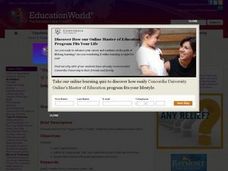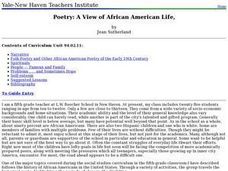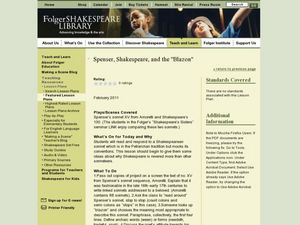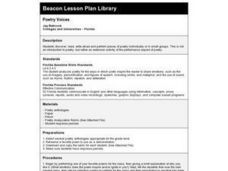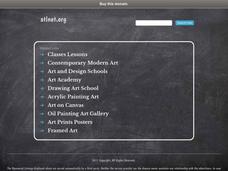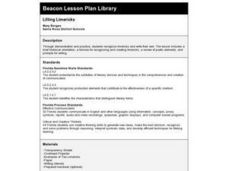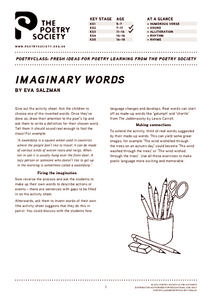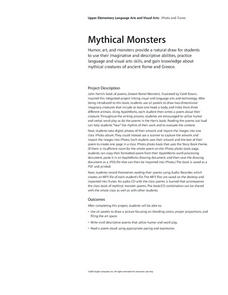Curated OER
The Raven
After a close reading of Edgar Allan Poe's "The Raven" individuals copy the rhythm and rhyme scheme and rewrite the final stanzas of the poem.
Curated OER
"Giggle Poetry" Theater
Young scholars read and perform "Giggle Poetry Theater." In small groups, they read the poems, collect props, rehearse, and present their poem to their classmates.
Curated OER
Poetry: A View of African American Life,
Fifth graders analyze many examples of African-American poetry and examine how different poems reflect the cultural experiences of African-Americans. The poems and spirituals chosen are very effective for public presentation.
Harper Collins
The Giving Tree Anniversary Teaching Guide
Celebrate poetry month all of April with a guide that uses six of Shel Silverstein's most famous books as a basis for the lessons. Discussion questions and writing activities are provided for each of Silverstein's books.
Poetry4kids
How to Write a Traditional “Mother Goose” Nursery Rhyme
There may be some little lambs, itsy bitsy spiders, and pumpkin eaters in your language arts class! An online poetry lesson takes learners through the steps of writing a nursery rhyme with easy-to-follow steps and explanatory examples.
Curated OER
Reading, Writing, Reciting Exciting Poetry!
Students complete a poetry analysis unit. In this poetry analysis lesson, students study poetry by reading, reciting, and analyzing poems and their poets. Students study poetic devices, write their own poems, and complete hands-on...
Curated OER
Edgar Allan Poe-try
Oh the Poe-try of Edgar Allan! Apart from the punny title, not much more humor can be found in either Poe's works or in this quiz. The questions highlight the sad, dark focus of much of Poe's writing. Quotes from poems then have various...
Curated OER
Poetic Elements
Poetry is all about sound and rhythm. The sound of the words, the rhythm of the lines, and the emotional atmosphere created by these elements and the literary devices poets use, compress whole stories into a few stanzas. The specialized...
Curated OER
Spenser, Shakespeare, and the "Blazon": Lesson 4
Students discuss the meaning and tone of Shakespeare's Sonnet 130. In this sonnets lesson, students compare Spenser's sonnets to Shakespeare's. Students discuss specific words that add to the humor in Shakespeare's sonnet,...
K12 Reader
Adventures with Alliteration! - Adjectives
Have hearty humor with a handy, helpful handout! Kids work on their alliteration skills with a figurative language worksheet that focuses on alliterative adjectives and phrases. After kids add nouns to ten adjectives, they create five...
Curated OER
"Quack Said the Billy-goat"
Second graders read the poem together, "Quack Said the Billy-goat" and discuss what makes the poem funny and which words rhyme. They observe the teacher writing a new first verse, changing some of the text, but leaving the original rhyme...
Curated OER
Poetry Voices
Students investigate the performance aspect of poetry by reading, writing and discussing poetry pieces.
Curated OER
Cool School Poetry
Students generate a word bank drawing on vocabulary from fifteen school related topics. They use the word bank to write poetry in the styles of Shel Silverstein and Jack Prelutsky.
Curated OER
Exploring the Poetry of Pablo Nueruda
Students read selected poems by Pablo Neruda. They also read short biographies of the author online to gain a better knowledge of the types of adversity Neruda faced throughout his lifetime. They begin to explore the concept of imagery...
Curated OER
Syber-Silverstein: Poetry in Motion
Sixth graders explore the writing of Shel Silverstein. They listen to the story, The Giving Tree, explore the Shel Silverstein website, read poems, and create and write a humorous poem.
Poetry4kids
How to Write a Silly Song Parody
Imitation is the sincerest form of flattery—and it's a great way to learn about poetic structure! Young poets use familiar tunes to write a song parody based on straightforward guidelines.
Curated OER
Impacting Indiana
Fourth graders become familiar with the culture and history of Indiana. For this James Whitcomb Riley lesson, 4th graders read poetry which includes the dialect of Indiana. Students analyze the poem. Groups memorize and...
Curated OER
Analyzing Literary Devices
Eighth graders identify figurative language and poetry in this literary analysis lesson. Using Through the Looking Glass by Lewis Carroll and a YouTube video for "The Walrus and the Carpenter," young readers complete a literary device...
Curated OER
The Pillsbury Doughboy
Mourning the death of the Pillsbury Doughboy (from a yeast infection and pokes in the belly), this presentation discusses the use of puns, metaphors, and polysemes. The slide show continues by discussing other popular metaphors and...
Curated OER
Lilting Limericks
Young scholars discover the formula for writing limericks and use it to write their own poems.
Curated OER
Langston Hughes: Voice Among Voices
Students study Langston Hughes's poetry, short stories, and his first autobiography. They read and appreciate the candid, honest and powerful creative masterpieces of this black genius and discuss the numerous universal themes and...
Poetry Society
Imaginary Words
Oh, what fun! Young logophiles and neologists create a dictionary-sounding definition for imaginary words and try to fool their classmates.
Curated OER
Mythical Monsters
Students design mythical creatures and write poems about them. They take digital pictures of their artwork and create a digital picture book. They record their readings of the poetry to be added a class recording.
Curated OER
Preparing Students to Read the Aeneid
Teaching the Aeneid this year? Read this quick article to develop some plans and strategies for teaching the epic poem to your advanced learners.



